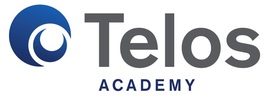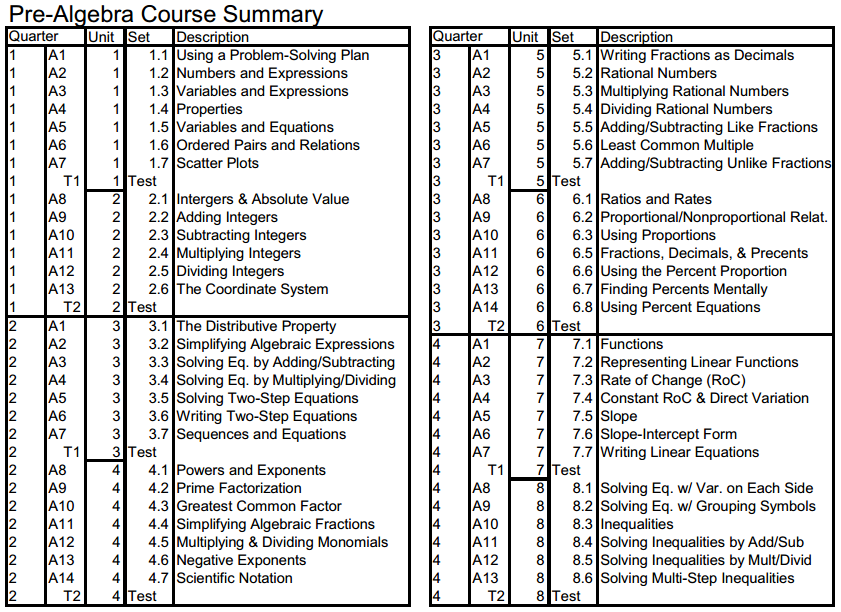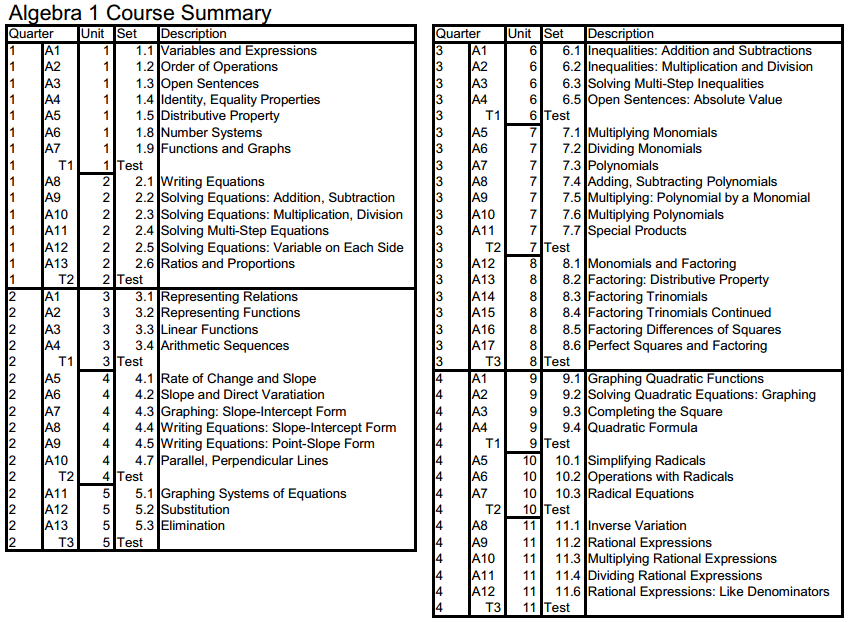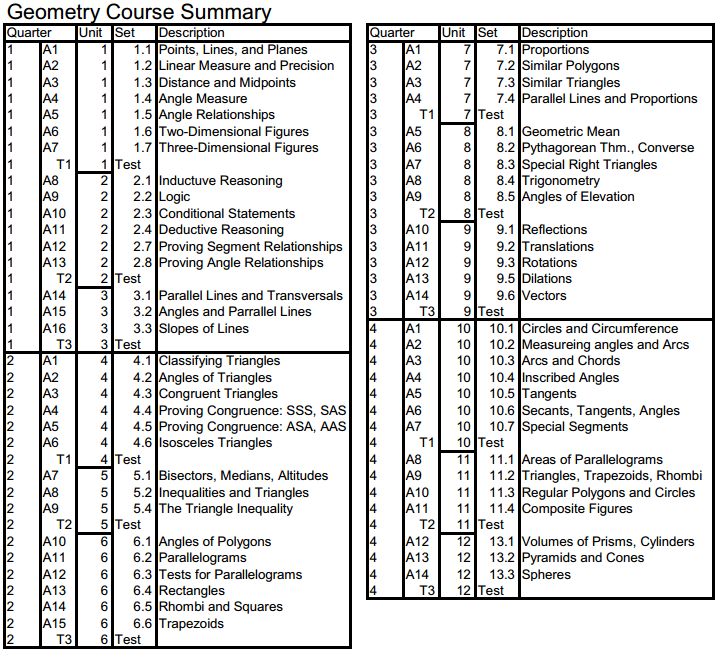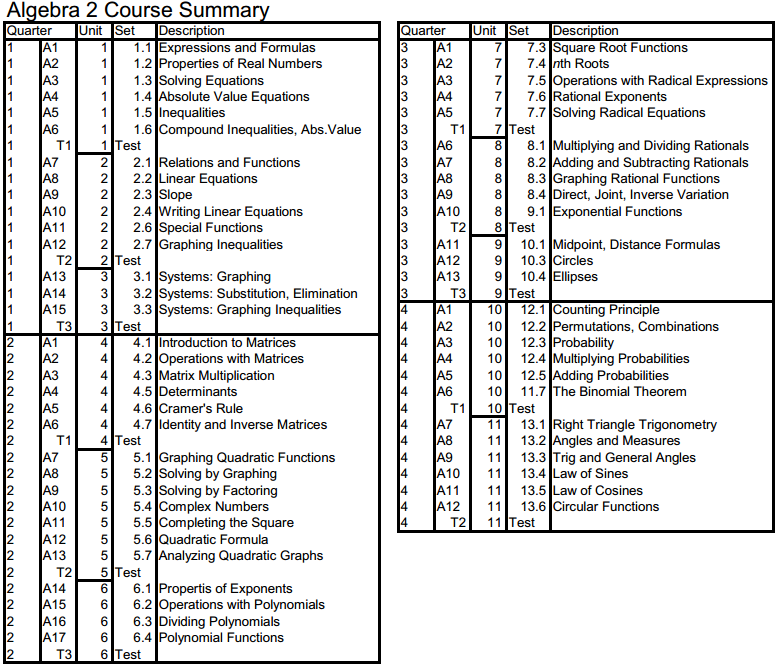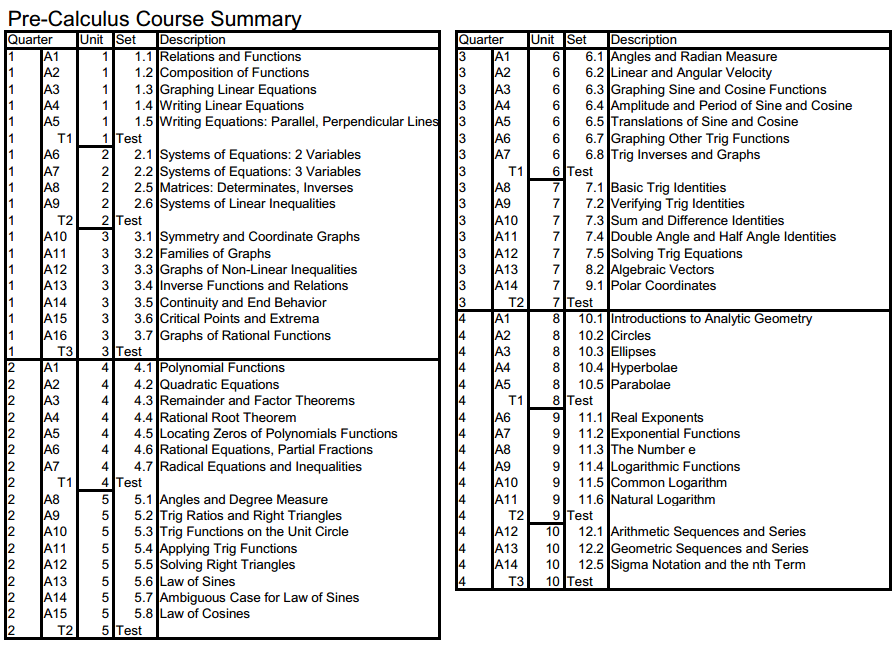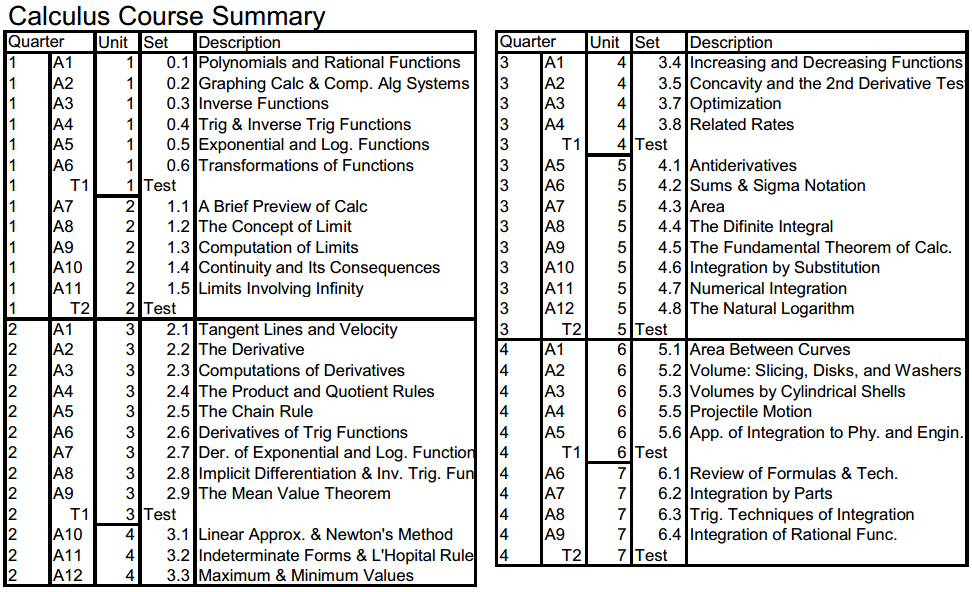Math
|
Teacher Information
Raeann Hansen - [email protected] Courses Offered Pre-Algebra (Depending on Demand) Algebra 1 Geometry Algebra 2 Pre-Calculus (Depending on Demand) Calculus (Depending on Demand) |
Class Guidelines:
Class discussion and participation are required. If you are unclear concerning any concepts or assignments, please discuss it with me. Please don’t wait until it is too late to resolve problems and please be responsible about turning assignments in on time. Flex attendance is expected when students fall behind or just need extra help.
Grading
Assignments
There will be at least 1 assignment paired with each course objective/topic. These could include, but are not limited to, problems in the book, worksheets and quizzes. It is typical to have 2-3 assignments per week.
Exams
There will be exams throughout the quarter after each chapter is complete. These exams will cover content discussed in class. These exams will be problems that you will need to show your work. Partial credit is given for each problem.
Participation
Students may earn 10 points a day for participation, usually 40 points per week. Deductions to points include:
Citizenship
How to earn a….
H:
Class discussion and participation are required. If you are unclear concerning any concepts or assignments, please discuss it with me. Please don’t wait until it is too late to resolve problems and please be responsible about turning assignments in on time. Flex attendance is expected when students fall behind or just need extra help.
Grading
- 40% Assignments
- 40% Exams
- 20% Participation
Assignments
There will be at least 1 assignment paired with each course objective/topic. These could include, but are not limited to, problems in the book, worksheets and quizzes. It is typical to have 2-3 assignments per week.
Exams
There will be exams throughout the quarter after each chapter is complete. These exams will cover content discussed in class. These exams will be problems that you will need to show your work. Partial credit is given for each problem.
Participation
Students may earn 10 points a day for participation, usually 40 points per week. Deductions to points include:
- -5 for tardy
- -10 for unexcused absence or refusing class
- -10 for poor participation—not completing work or even trying to do so
Citizenship
How to earn a….
H:
- Using all the time given to make your work as good as it can be.
- Following the BASICS.
- Having all of your work turned in.
- Perfect Attendance and Participation
- Turning in work but not going above and beyond.
- Consistently miss/be late to class.
- Talking out of turn/being disruptive.
- Not following the BASICS.
Course Descriptions:
Pre Algebra
Pre Algebra is designed to give students the fundamental skills necessary to succeed in the Algebra course taken the following year. Students will explore arithmetic operations, number systems and properties, measurement, geometry, and an introduction to algebraic thinking and concepts.
Pre Algebra
Pre Algebra is designed to give students the fundamental skills necessary to succeed in the Algebra course taken the following year. Students will explore arithmetic operations, number systems and properties, measurement, geometry, and an introduction to algebraic thinking and concepts.
Algebra
Algebra is designed to give students the requisite skills that provide a foundation for all future mathematics courses. Students will explore writing and solving linear equations, powers and exponents, quadratic equations, polynomials and factoring, graphing and solving linear inequalities, functions, and geometry.
Algebra is designed to give students the requisite skills that provide a foundation for all future mathematics courses. Students will explore writing and solving linear equations, powers and exponents, quadratic equations, polynomials and factoring, graphing and solving linear inequalities, functions, and geometry.
Geometry
Geometry is designed to emphasize the study of the properties and applications of common geometric figures in two and three dimensions. It includes the study of transformations and right triangle trigonometry. Inductive and deductive thinking skills are used in problem solving situations, and applications to the real world are stressed. It also emphasizes writing proofs to solve (prove) properties of geometric figures. Students who complete Geometry should take Algebra II next.
Geometry is designed to emphasize the study of the properties and applications of common geometric figures in two and three dimensions. It includes the study of transformations and right triangle trigonometry. Inductive and deductive thinking skills are used in problem solving situations, and applications to the real world are stressed. It also emphasizes writing proofs to solve (prove) properties of geometric figures. Students who complete Geometry should take Algebra II next.
Algebra 2
Algebra 2 is designed for students to conceptualize, analyze, and identify relationships among functions. This course builds on concepts learned in Algebra 1 and Geometry by extending linear algebra and coordinate geometry concepts to other functions and systems of equations. Students will develop proficiency in analyzing and solving quadratic functions using complex numbers. Students will investigate and make conjectures about absolute value, radical, exponential, logarithmic and sine and cosine functions algebraically, numerically, and graphically, with and without a graphing calculator. Students will extend their algebraic skills to compute with rational expressions and rational exponents. Students will analyze statistical data and apply concepts of probability using permutations and combinations. Students will apply mathematical skills and make meaningful connections to life’s experiences.
Algebra 2 is designed for students to conceptualize, analyze, and identify relationships among functions. This course builds on concepts learned in Algebra 1 and Geometry by extending linear algebra and coordinate geometry concepts to other functions and systems of equations. Students will develop proficiency in analyzing and solving quadratic functions using complex numbers. Students will investigate and make conjectures about absolute value, radical, exponential, logarithmic and sine and cosine functions algebraically, numerically, and graphically, with and without a graphing calculator. Students will extend their algebraic skills to compute with rational expressions and rational exponents. Students will analyze statistical data and apply concepts of probability using permutations and combinations. Students will apply mathematical skills and make meaningful connections to life’s experiences.
Pre-Calculus
This course deals with topics in college-level algebra and trigonometry. Before taking this course, students should have mastered geometry and high school-level algebra. This course is intended for college bound students. The skills learned in this course will (1.) enhance the student's SAT/ACT Math abilities, (2.) prepare the student for success in required undergraduate math courses in the U.S. ,and (3.) prepare the student for the study of Calculus if the student chooses to do so. Following the Utah Core State Standards for Precalculus (as of 2014), students will do the following in this course:
This course deals with topics in college-level algebra and trigonometry. Before taking this course, students should have mastered geometry and high school-level algebra. This course is intended for college bound students. The skills learned in this course will (1.) enhance the student's SAT/ACT Math abilities, (2.) prepare the student for success in required undergraduate math courses in the U.S. ,and (3.) prepare the student for the study of Calculus if the student chooses to do so. Following the Utah Core State Standards for Precalculus (as of 2014), students will do the following in this course:
- Students will use the language and operations of algebra to evaluate, analyze and solve problems.
- Students will understand and represent functions and analyze function behavior.
- Students will use algebraic, spatial, and logical reasoning to solve geometry and measurement problems.
- Students will understand concepts from probability and statistics and apply statistical methods to solve problems.
Calculus
This course deals with topics in both differential and integral calculus. Before taking this course, students should have mastered geometry, high-school-level algebra, and precalculus (trigonometry and college algebra). This course is intended to prepare students for the Calculus BC AP Exam. The duration of this course is one academic year.
This course deals with topics in both differential and integral calculus. Before taking this course, students should have mastered geometry, high-school-level algebra, and precalculus (trigonometry and college algebra). This course is intended to prepare students for the Calculus BC AP Exam. The duration of this course is one academic year.
